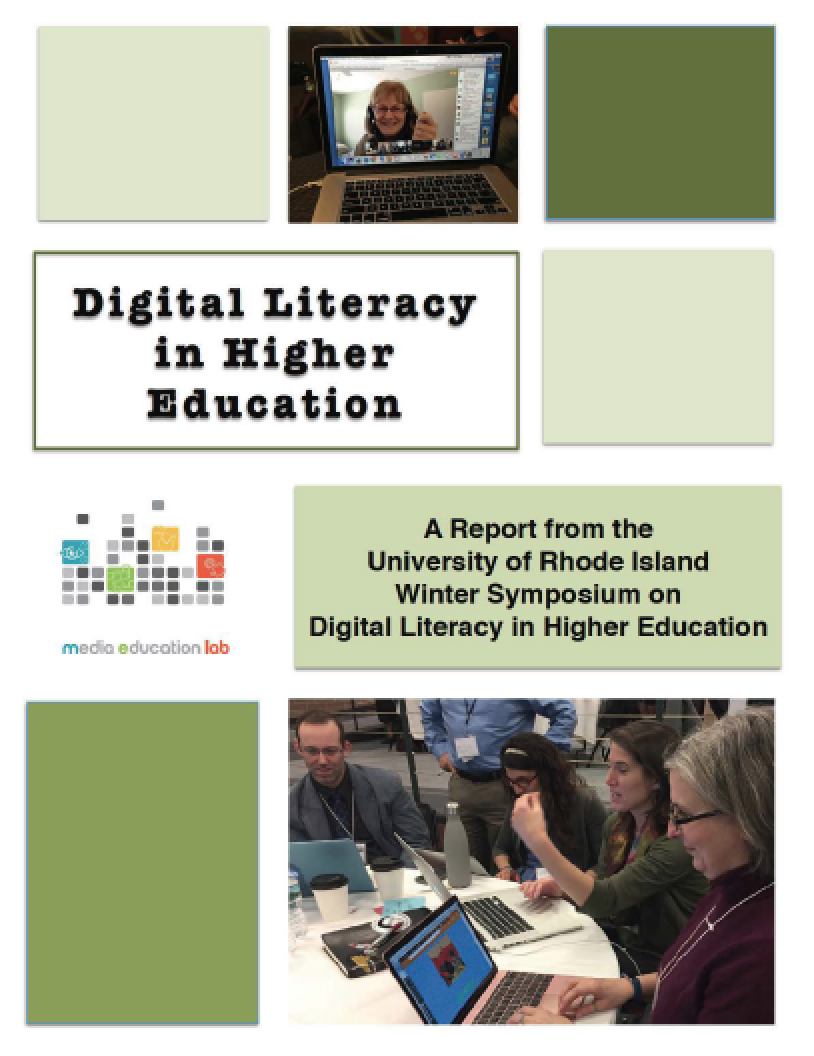 Digital Literacy in Higher Education: A Report documents the key ideas that emerged from the Winter Symposium on Digital Literacy in Higher Education, a gathering of 56 higher education faculty held in January 12 – 13, 2017, including participants from the fields of education, communication and media, art and design, the humanities and social sciences, along with academic librarians and educational technology specialists.
Digital Literacy in Higher Education: A Report documents the key ideas that emerged from the Winter Symposium on Digital Literacy in Higher Education, a gathering of 56 higher education faculty held in January 12 – 13, 2017, including participants from the fields of education, communication and media, art and design, the humanities and social sciences, along with academic librarians and educational technology specialists.
In this report, we share insights that emerged from the program, where participants explored new models of professional development to advance knowledge, pedagogy and practice in digital literacy in higher education. The symposium’s goal was to understand the challenges and opportunities regarding the future of digital literacy on college campuses, to determine what research needs exist in this area, and to brainstorm new approaches to professional development that may advance digital literacy in higher education.
Key ideas include:
● Inspiring curiosity and interest in digital literacy. Faculty are inspired by learning about the efforts of colleagues who have experienced success in using digital media and technology to advance student learning
● Peer-to-peer sharing. Informal sharing of “good practices” in virtual and face-to-face settings creates customized learning opportunities for faculty in a risk-free, non-commercial, no-pressure environment.
● Building consensus through disciplinary dialogue. When faculty gather in disciplinary teams to discuss the particularities of digital literacy within the subject area specialities, they share digital literacy practices that can be easily adopted by peers, thus facilitating the transfer of innovative pedagogies.
● Big picture perspective. A mix of faculty (from all 13 colleges and schools in Rhode Island along with faculty from 13 states and 3 countries) broadened faculty horizons and reminded faculty of our profound responsibilities to empower a new generation of students for life, careers and citizenship in an increasing digital and media-saturated society.
Throughout the symposium, participants recognized some critical needs for the future:
● A broad political vision about why digital literacy matters. Without a shared understanding of digital literacy, disciplinary silos will continue to contribute to uneven digital literacy implementation. A coherent and broad sense of importance must be linked to our concerns about the future of higher education and the role it serves in an increasingly global and mediatized society. Core value messages about improving learning may imbue all higher education constituents with the wherewithal to pursue digital literacy in college classrooms that extend beyond digitizing traditional practice and, instead, create deeper and more meaningful literacy learning for all.
● New models of digital literacy professional development. More and more faculty in higher education recognize the need to advance their own competencies in digital literacy and see the potential for how it may improve teaching and learning for students enrolled at colleges and universities. Because faculty independence is prized, professional development in digital literacy cannot be mandated. Showcases, awards and recognition of best practices and formal and informal professional development can support peer-to-peer learning that gives faculty time for sharing and collaboration.
● Social media networks that extend spaces for scholarship. Networked scholarship is transforming faculty research, learning, and teaching. Faculty are increasingly turning to social media as spaces to build intentionally-designed personal learning networks, understand how to be networked learners, and uncover ways to model digital communication in their own teaching practices. Social media create ways for faculty to filter, curate, organize, and navigate information streams and need to be further investigated as ways of mitigated academic community building.
● Support for critical thinking as part of digital literacy frameworks. Digital literacy is inherently tied into critical understanding, critique, use, and assessment of digital tools and texts. Digital literacy is not a mere collection of skills for using technology. Instead, digital literacy is fundamentally an extension of literacy, in which access, analysis, evaluation and reflection are required, iterative practices that promote understanding, growth, and learning. Consideration of ethics, habits of mind, socio-emotional competencies and dispositions enable students to develop critical digital literacy competencies.
This report on digital literacy in higher education builds upon a peer-to-peer knowledge community (using the hashtag #digiURI) that has been exploring digital literacy in elementary and secondary education, school and public libraries, and in higher education institutions for four years.
Download and read the complete report here: